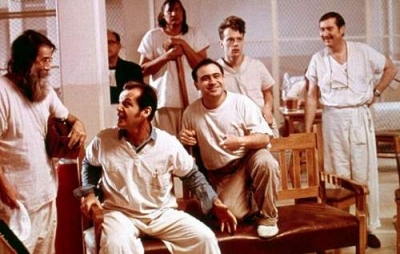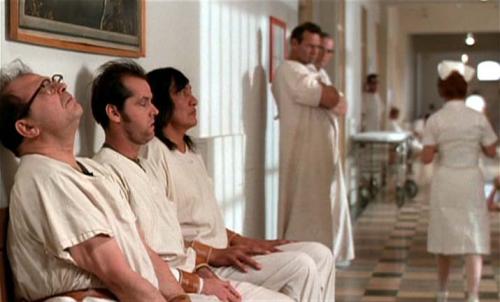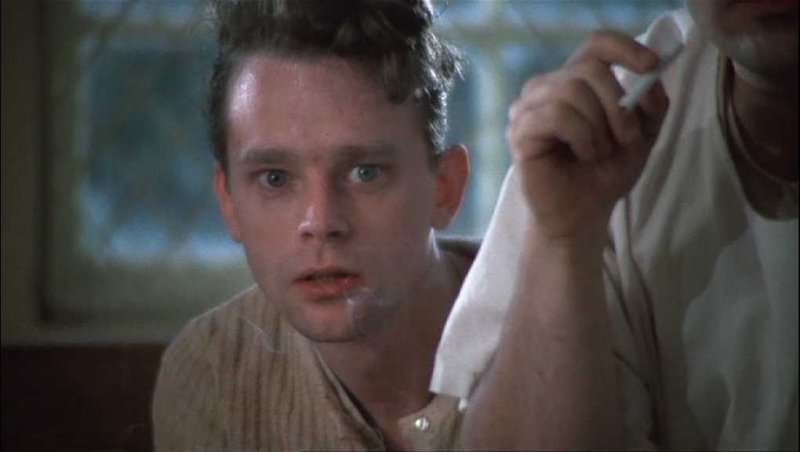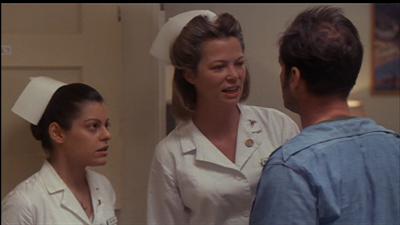Director: Milos Forman
Cast: Jack Nicholson, Brad Dourif, Danny DeVito, Christopher Lloyd, William Redfield, William Duell, Vincent Schiavelli, Louise Fletcher, Mews Small, Will Sampson, Sydney Lassick
Hey there, it's Liz. Welcome to the Psycho Ward's Classic Film Reviews blog. I'd like to have my first official review of a film be one of my favorite films, naturally.
One Flew Over the Cuckoo's Nest is, of course, based on the 1962 novel by Ken Kesey. I read the novel in my Introduction to Literature class (Professor Potts, if you're reading this, you're the best, man) and absolutely loved it. I'm an English major, so I followed the film critic's/English major's golden rule: read the book before you see the movie.
The novel is told from the point of view of a Native American known as Chief "Broom" Bromden (Will Sampson in the film). The Chief has been placed in the Oregon State Hospital in Salem, Oregon, Kesey's home state (assume all characters are native Oregonians, since Kesey does not specify where they are from in the novel). Although the novel was written in the early 60s, it foreshadows one of the main trends that would arise in the late 60s: drug use to alleviate problems.
Back to the plot: Chief witnesses the arrival of a new patient, Randle Patrick McMurphy (Jack Nicholson), a brash, thirty-five-year-old Irishman who has curly red hair, tattoos, muscles, and lust for women. McMurphy fits in quite well with the other patients, Billy Bibbit (Brad Dourif), a nervous, stuttering, boyish man, Martini (Danny DeVito), who is delusional, Dale Harding (William Redfield), who is gay, Jim Sefelt (William Duell) and Bruce Fredrickson (Vincent Schiavelli), both of whom suffer from epilepsy, Charlie Cheswick (Sydney Lassick), who suffers from childlike temper tantrums, and Max Taber (Christopher Lloyd), who is in the film but not in the novel (in the novel, Chief describes Taber as a patient that was released before McMurphy's arrival at the ward a sane individual due to the "Combine's" processes). Later on, in what I like to call "his later adventures," McMurphy learns that he, Taber, and Chief are the only chronics that are to stay on the ward until further notice from the proper authorities. The rest are free to leave whenever they wish.
Speaking of the proper authorities, McMurphy's ward in the hospital is run by Nurse Mildred Ratched (Louise Fletcher), a completely oppressive woman. She believes strictly in rule and order in the ward and refuses to let up when McMurphy insists that she change the ward policy so that the patients can watch the World Series.
Eventually, McMurphy rallies the other patients to rebel against Nurse Ratched's oppressive dictatorship (iconic line: Sydney Lassick's "May I have my cigarettes please, Nurse Ratched?"). Towards the end of the novel/film, McMurphy throws a party, bringing along his "girlfriend" (deemed appropriately, fuck buddy) Candy (Mews Small) and her friend (aka fellow prostitute) Rose. Billy Bibbit confides in McMurphy that he has a crush on Candy. Of course, McMurphy's idea of a date is different from the rest of the ward's, and so he convinces Billy to sleep with Candy. The morning after, Nurse Ratched arrives, surveys the damage, and questions Billy. When she asks Billy if he is ashamed of what he has done, Billy announces confidently and without stuttering that he is not. However, when she mentions his mother, Billy's stutter returns. McMurphy, on the other hand, becomes so enraged with Nurse Ratched that he chokes her nearly to death. Billy cannot take the stress of his mother finding out that he is no longer a virgin and commits suicide.
In the end, to put a stop to his rebellious ways, Nurse Ratched has McMurphy lobotomized. Chief suffocates the listless McMurphy and lifts the water fountain that McMurphy had tried to lift earlier and escapes.
NOW, ONTO THE FILM...
The Academy Awards the cast and crew won were truly deserved. The film, while in some places inaccurate (hey, I'm an English major, I like accuracy), does a terrific job of showcasing the life of mental hospital patients. I've often said it's like Holes for adults. Why Kesey still feels, even after seeing Jack Nicholson's absolutely terrific performance as McMurphy, that Gene Hackman would have been better suited for the role is beyond me. While I can somewhat (somehow) picture Hackman in the role because of his red hair, Jack Nicholson, while he didn't have the red hair, the tattoos, and the muscles, was pure McMurphy attittude-wise. He couldn't quite manage the stereotypical Western accent that we see in the book, but his outburst after Nurse Ratched overrules the vote to watch the World Series is priceless ("NOW I WANT THAT TELEVISION SET TURNED ON!!!").
I have recently discovered that Brad Dourif was nominated for Best Supporting Actor, but lost to George Burns for his role as Al Lewis in The Sunshine Boys. I must ask: why?!?!? Dourif not only gave us a lovable yet troubled Billy Bibbit, but he also gave us the most interesting and adorable hairstyle since The Beatles' mop tops, which in turn made us love him even more.
Another cool fact I read about in my really cool $39-something Collector's Edition DVD package is that Dean Brooks, who plays Dr. Spivey, was the actual superintendent of the Oregon State Hospital at the time the film was being shot. He wholly supported the film's release. However, he became extremely frustrated with his lines. Despite this, Forman called him and said that he had been cast as Spivey. Brooks would find out later that all of his scenes would be improvised. Watching Brooks' interview with McMurphy in the film (the bulk of his lines come from this scene), it doesn't even seem that way. I can't even improv that well. He makes it look perfect. Terrific improv job. Brooks turned over his entire hospital ward to Forman and the crew, and almost all of the patients would be involved in the project.
THE INACCURACIES:
- The appearance of Taber, as I stated above, though Christopher Lloyd was absolutely terrific, as always.
- Cheswick is supposed to drown himself, and he doesn't.
- Chief is supposed to come on the fishing trip. Instead, he plays more of a Zero-esque character, helping McMurphy escape to hijack the bus.
- Speaking of which, McMurphy DOES NOT hijack a bus.
- The scene with Harding's wife coming to visit is not in the film.
- Candy's friend's name is not Rose in the book, it is Sandra/Sandy.
- McMurphy is supposed to be thirty-five years old. In the film, Dr. Spivey lists his age as thirty-eight, which was Jack Nicholson's age at the time.
- Nurse Ratched's first name is never given in the novel.
A NOTE OF CAUTION: Some who have read the book may find the film a bit hard to follow, as it is told from McMurphy's point of view and not Chief's. I myself had no problem because I was forewarned, so I hope that helps. :)
Some stills from the film:
Jack Nicholson...such a CUUUUTIE!!!! ^_^
































No comments:
Post a Comment